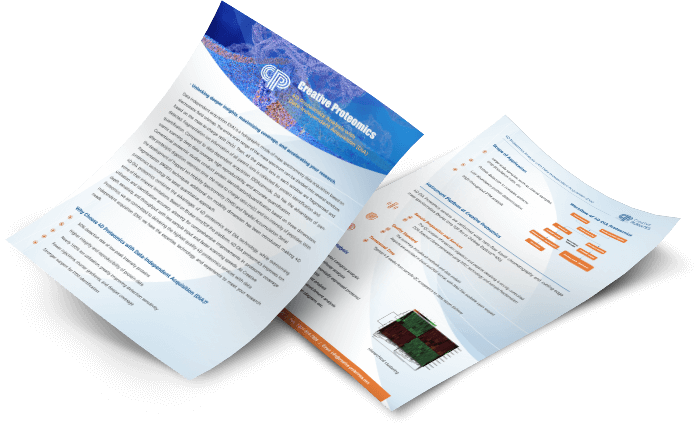Definitive Screening Design for Library-Free DIA-MS
For the examination of biological materials, mass spectrometry (MS) has emerged as an essential technology that offers insights into intricate proteomes. Techniques for library-free data-independent acquisition mass spectrometry (DIA-MS) have been developed as a result of the search for more accurate and efficient proteomics procedures. Applying definitive screening design (DSD) has been one of them that has changed the game.
Creative Proteomics is an industry leader in proteomics research. Relying on a state-of-the-art technology platform and a dedicated team of researchers, we are committed to library-free DIA-MS identification and quantification of deterministic screening designs that provide insights into the in-depth study of complex proteomes.
Methodology in Library-Free DIA-MS Identification and Quantification
Definitive Screening Design (DSD) is a systematic approach used for the optimization of data-independent acquisition (DIA) parameters in mass spectrometry. Unlike traditional methods that require extensive assessments of individual parameters, DSD enables the simultaneous exploration of multiple parameters, significantly reducing the time and sample quantity required for optimization. By using a library-free methodology and surrogate samples, DSD maximizes sample space, making it ideal for comprehensive parameter optimization.
Significance of DSD for Library-Free DIA-MS
The significance of DSD in library-free DIA-MS lies in its ability to unlock the full potential of mass spectrometry for proteomic analysis. This innovative approach addresses the limitations associated with time and sample availability. DSD identifies key parameters that have a significant impact on method performance and predicts ideal values for these parameters. As a result, DSD enhances reproducibility and detection capabilities, ultimately leading to an increased number of peptide identifications.
Applications of DSD in Proteomics
DSD has been successfully applied in various proteomic studies, particularly in the identification and quantification of low-abundance biomolecules, such as neuropeptides. Our researchers leveraged DSD to optimize DIA-MS parameters for the analysis of crustacean neuropeptides. The results were compared to data-dependent acquisition (DDA) and a published DIA method, showcasing the superiority of DSD in identifying 461 peptides, as opposed to 375 and 262 with DDA and the traditional DIA method, respectively.
Technical Process
The technical process of DSD for library-free DIA-MS is a multi-step approach. Researchers start by selecting the parameters that influence method performance and defining their ranges. Next, a DSD design matrix is created, which includes multiple combinations of parameter values. Surrogate samples are used to analyze these combinations, and the results are processed using statistical methods. DSD not only identifies critical parameters but also predicts optimal values to maximize the performance of the mass spectrometry analysis.
Our Service Workflow

Definitive Screening Design (DSD) has emerged as a powerful tool in the field of proteomics, specifically in the realm of library-free data-independent acquisition mass spectrometry. Its ability to efficiently optimize multiple parameters while conserving precious samples and time makes it invaluable for the identification and quantification of biomolecules, especially those in limited availability. DSD's impact on reproducibility and detection capabilities is undeniable, opening new avenues for the analysis of low-abundance isoforms and disease-related biomolecules. The future of proteomics looks brighter with DSD leading the way.
* For Research Use Only. Not for use in the treatment or diagnosis of disease.



 4D Proteomics with Data-Independent Acquisition (DIA)
4D Proteomics with Data-Independent Acquisition (DIA)